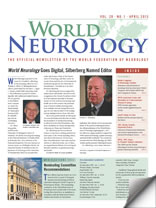The WFN will award grants for specific educational or applied research projects in neurology and the applied neurosciences as part of its activities as a registered charitable organization and its mission to “foster quality neurology and brain health worldwide.” [Read more…]
WFN, TNS Team to Present Turkish Initiative
The World Federation of Neurology (WFN) and the Turkish Neurological Society (TNS) are delighted to be partnering for another year to present the Turkish Initiative. [Read more…]
JNS Shows Growth, Improved Reach
The Journal of the Neurological Sciences enjoyed another year of growth with a 6 percent increase in submissions in 2012. During the last 15 years, the journal has shown enormous growth and improved impact throughout the medical world. The impact factor rose from 1.398 in 1998 to 2.353 in 2011. Submissions rose to 1,459 in 2012. [Read more…]
Annual General Meeting of the Council of Delegates
 The Annual General Meeting of the Council of Delegates will be held Sept. 22 during the World Congress of Neurology in Vienna. [Read more…]
The Annual General Meeting of the Council of Delegates will be held Sept. 22 during the World Congress of Neurology in Vienna. [Read more…]
Gerrit Grijns in Java: Beriberi and the Concept of ‘Partial Starvation’

Dutch physician Gerrit Grijns (1865-1944) from the University of Utrecht. Courtesy of the Journal of Nutrition.
At the end of the 19th century, Dutch physician Gerrit Grijns (1865-1944) from the University of Utrecht, working in Java in the Dutch East Indies (now Indonesia), developed a dietary deficiency explanation of the nutritional neuropathy beriberi that presaged the “vitamin doctrine.” Although Grijn’s work was overshadowed by that of Christiaan Eijkman (1858-1930), his predecessor, Grijns developed a new pathophysiological concept — dietary deficiency of a micronutrient causing neurological disease, while Eijkman recognized a role of dietary factors, but never fully moved beyond increasingly improbable bacteriological mechanisms. [Read more…]
Professor Mario Tolentino Dipp 1928-2012
 Unquestionably, the father of Dominican neurology.
Unquestionably, the father of Dominican neurology.
Honest, studious in the extreme, a teacher by vocation, untiring worker, dedicated to his patients and his pupils. He gave of himself everything that can be expected from a great teacher and a great man. [Read more…]
WFN Launches Coma and Disorders of Consciousness Research Group
The trustees of the World Federation of Neurology (WFN) recently approved a newly created Applied Research Group on Coma and Disorders of Consciousness, chaired by Steven Laureys. [Read more…]
World Congress of Neurology Update
WFN takes stock and makes preparations during the years in between World Congresses. The WFN was successful with its Marrakesh Congress, thanks to our Moroccan organizers. The “With Africa, For Africa” slogan worked extremely well. The attendance of 3,217 delegates from 125 countries exceeded expectations, and the scientific material presented was of a high standard. [Read more…]
Education Committee Standard Operating Procedures
The following documents produced by the Education Committee are under constant review to best represent the needs of the WFN and its member countries. [Read more…]
The Education Committee of the WFN
More than 50 years ago, the World Federation of Neurology (WFN) was established to facilitate dialogue in neuroscience research. With the advent of enhanced travel, communication and, in particular, the Internet, neuroscience research has come to exist independently on the world stage and is self-sustaining. Neurology education, on the other hand, though to some extent supported by the same phenomena, is not globally self-sustaining. [Read more…]




